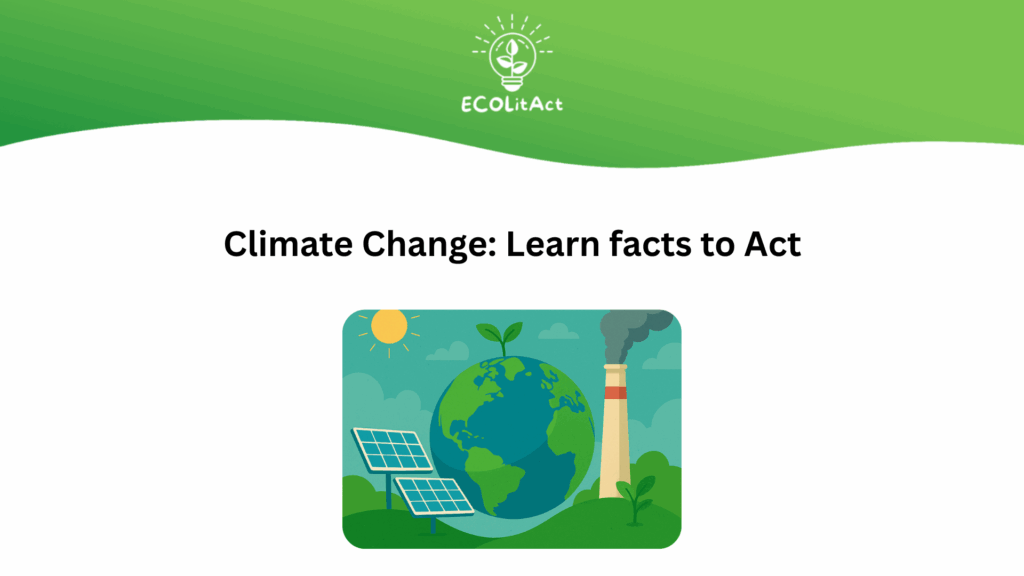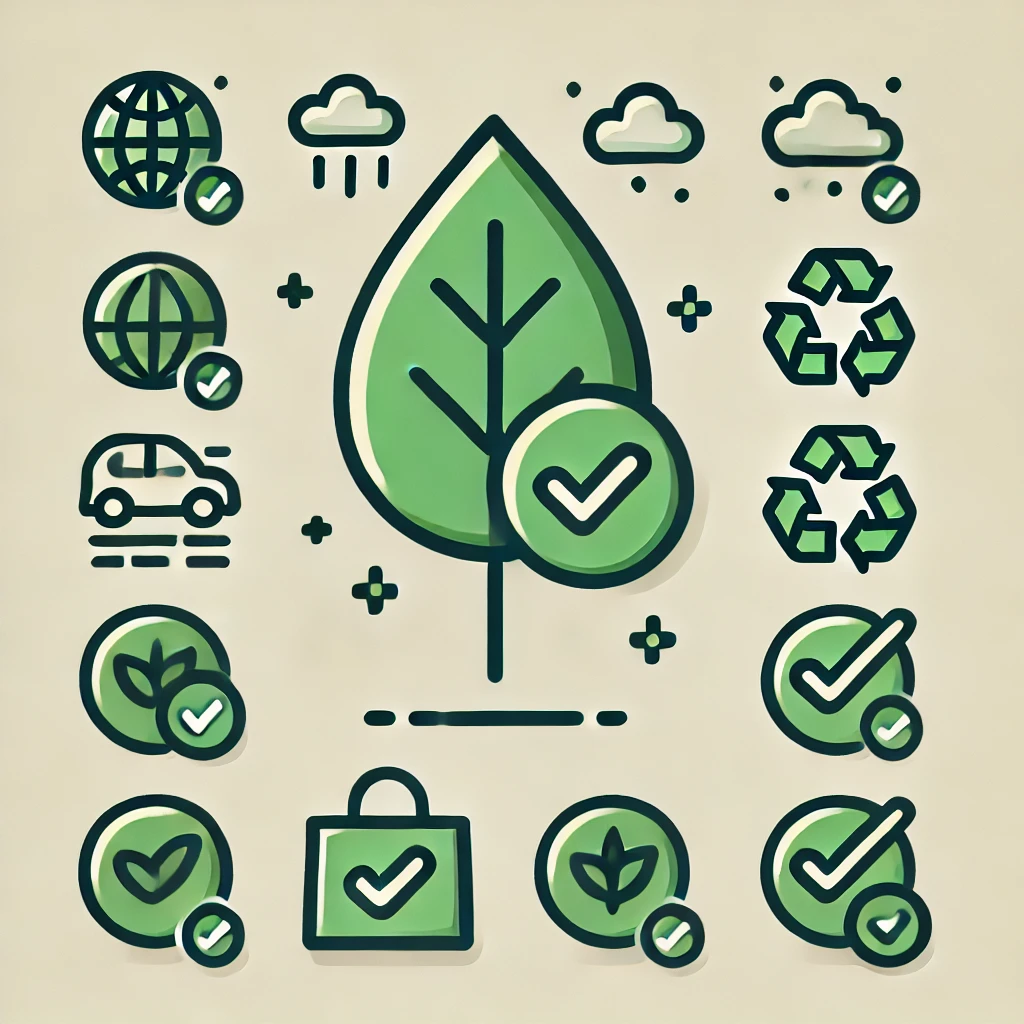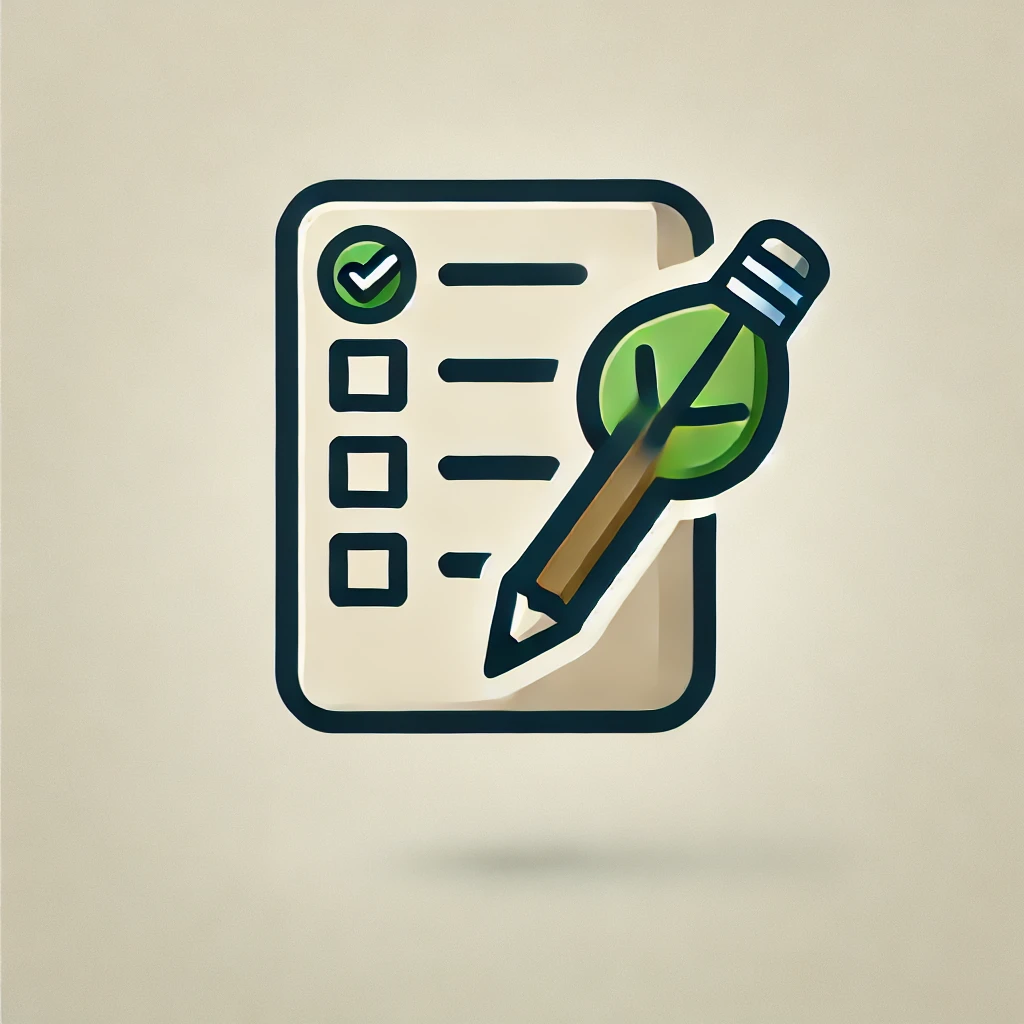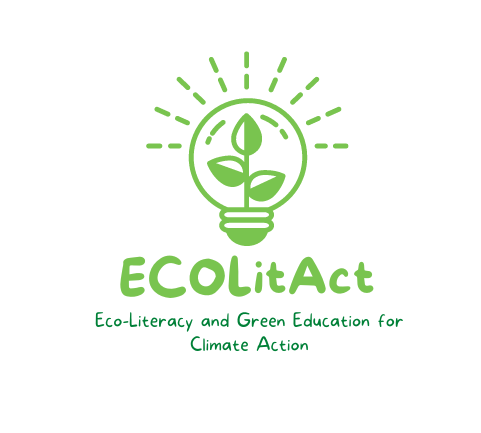Introduction and Learning Objectives | Vocabulary |Video: “Climate Change – How Does It Really Work? | Climate vs Environment | Climate Change – Causes and Consequences | Identify the Causes of an Environmental Issue | Activity! Identify the Causes of an Environmental Issue | Final Quiz | Conclusions | Europass
Welcome! This module will introduce you to the essential concepts of climate change, its underlying causes, and its consequences for our planet. You will learn the difference between climate and environmental change, how human activities contribute to climate shifts, and the significant health impacts that climate change brings. By the end of this module, you’ll understand why climate change is a global priority and how to apply this knowledge to promote sustainability in your life.

Learning Objectives
By the end of this lesson, you will:
- Define climate change and differentiate it from environmental change.
- Understand the major causes of climate change, including both human and natural factors.
- Recognize how climate change affects global health and the health system.
- Identify the significant consequences of climate change on both the environment and human society.
Lesson Duration:
This lesson is self-paced and designed to be completed in approximately 2 hours.
Get Ready and Learn the Key words!
Before you dive into the lesson, take a moment to explore the vocabulary we’ll be using. Understanding these key terms will help you follow the materials more easily and talk about climate change with confidence.
Use the dialogue cards below to learn important words and concepts connected to climate change and the environment.
Flip each card to see what the term means — and try to remember it!
You’ll see these words again as we go deeper into the topic.
Watch the Video: “Climate Change – How Does It Really Work?”
Before we dive deeper into the topic, let’s break down the basics.
This short video from ClimateScience clearly explains how climate change happens, what causes it, and why it matters.
Watch closely to understand the science behind the greenhouse effect and how human activities are changing our planet’s climate.
🔍 What Have You Learned from the Video?
Read each statement carefully and decide whether it is True or False based on the information from the video “Climate Change: How Does It Really Work?”.
This quick quiz will help you check your understanding of the basic concepts of climate change.
Climate vs Environment
This presentation helps clarify the difference between “climate” and “environment.” It explains that climate refers to long-term weather patterns in a region, while the environment encompasses all the conditions that affect life on Earth, including climate. This distinction is essential in understanding climate change’s broader implications.
Interactive Activity – Drag the Words
Drag the correct words into the blanks to complete each sentence. Need help? Check the presentation above.
Now you know…
- The distinction between climate and environment, and how climate change fits into the broader environmental context.
- How climate refers to long-term weather patterns, while the environment encompasses all conditions affecting life on Earth.

Action point:
Reflect on how the environment around you influences your daily life.
How can you start thinking about climate change in your own community and contribute to raising awareness?
Discuss these ideas with a peer or family member, and create a list of actions you can begin implementing to make a positive environmental impact.
Climate Change – Causes and Consequences
This timeline presentation details the evolution of climate change, covering both anthropogenic (human-caused) and natural drivers of climate shifts. It also highlights major consequences of climate change, including rising temperatures, extreme weather events, and ecosystem changes.
Now you know…
- The timeline of climate change and the major causes, both human-driven and natural, that have contributed to its development.
- How the consequences of climate change are already being seen through rising temperatures, extreme weather, and ecosystem disruption.

Action point:
After reviewing the timeline of climate change, reflect on the historical human activities that have contributed to the current climate crisis.
What actions from the past could have been avoided, and what lessons can we learn to reduce future harm?
Share your thoughts with others and brainstorm how collective actions can be more effective moving forward.
Activity! Identify the Causes of an Environmental Issue
What you’ll do:
In this activity, you’ll choose an environmental issue, identify its causes, and come up with possible solutions. Then, you’ll discuss your findings with your peers.
Steps:
- Choose an environmental issue – one problem, like pollution, deforestation, or climate change.
- Think about what causes this problem. Consider both human actions (like burning fossil fuels) and natural causes (like volcanic eruptions).
- Brainstorm ways to reduce or solve the problem. What actions can people take to help?
- Share your ideas with a friend or family member and discuss possible solutions together.
What will you gain:
This activity will help you understand the causes of environmental problems and come up with practical solutions that you and others can start working on.

Final Quiz
You’ve explored the key concepts of climate change and discovered how your actions can make a difference.
Now it’s time to review what you’ve learnt!
This final quiz will help you reflect on the main takeaways from the module and check your understanding. Don’t worry—it’s not about getting everything perfect but about seeing how far you’ve come.
Good luck!
Conclusions: What You’ve Learned
Congratulations on completing this module!
You’ve taken an important first step in understanding one of the most pressing issues of our time—climate change.
By now, you should be able to:
✅ Explain what climate change is and how it differs from environmental change.
✅ Identify the main causes of climate change, including both human and natural factors.
✅ Understand the major consequences of climate change on health, ecosystems, and society.
✅ Recognize the role of misinformation in shaping public understanding of climate topics.
✅ Reflect on how your everyday choices and local actions can support a healthier planet.
Climate change is a global challenge—but it starts with local action and personal responsibility.
Keep asking questions, keep learning, and most importantly—keep acting. 🌱
If you would like to learn more about climate denialism and how to combat it, you can continue with the Practitioner Level lesson on climate change.
Showcase your new skills with Europass
You have just completed another step in your learning journey. The skills and knowledge you have gained are valuable – not just for countering climate denialism and contributing to a greener future, but also for opening doors to new opportunities for you! A great way to do this is by adding them to your Europass profile.
Europass is a European Union initiative that helps individuals communicate their skills, qualifications, and experiences clearly and effectively. It consists of several documents, including the Europass CV, which is recognised across Europe and beyond, making it easier for learners to present their qualifications to potential employers or educational institutions.
If you don’t yet have a Europass profile, creating one takes just a few minutes. Get started here. And if you need a little help to set things up, you can take a look at this video tutorial.
For the lesson you have just completed, we encourage you to add the following skills:
- Comprehensive understanding of climate change and related issues
- Analytical reflection on climate change impacts and global consequences
- Awareness of differences between “climate” and “environment”
- Knowledge of interconnections between environmental and climate issues, and public health systems
